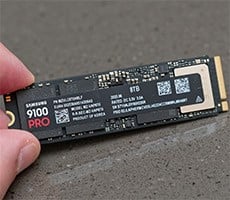What Happened To Apple's Software Quality?
It's safe to assume that the Mac's market share wouldn't even be as high as it is without the advent of OS X, which was a radically different OS from OS 9, and in many ways, it outpaced Windows XP. Granted, WinXP still stands as a popular OS from Microsoft. OS X made it look awfully dated though, and Apple's main problem quickly became the lackluster hardware it had to offer rather with an intuitive OS. After Appke switched to Intel CPUs, however, even that problem fell to the wayside. From OS X to OS X 10.4 (Tiger), Apple experienced few major issues. Of course there were loads of Apple loyalists who were angry about their OS 9 ("Classic") applications losing functionality in OS X, but that happens with every major OS overhaul regardless of the creating company.
One could even argue that Windows Vista copied some of the concepts introduced in OS X--as if Microsoft was attempting to play catch-up. But for as much criticism as Vista received (and rightfully so, in our own humble opinion), Leopard and Snow Leopard seemingly cruised ahead with little to no negativity following them around like black clouds. What's interesting here, is that we think everyone has missed the obvious. Apple's software track record was darn near impeccable (at least when compared to the hundreds of gaffes related to Windows) during the OS X 10.0 to 10.4 years, but something has happened since the introduction of OS X 10.5 ("Leopard"). And it's not something Apple should be particularly proud of.
OS X 10.5 was launched in the fall of 2007; needless to say, the majority of Apple's focus that year was on the original iPhone, which was yet another groundbreaking product. That phone was unveiled in the summer of 2007, but we're guessing the bulk of Q1 and Q2 2007 was spent fine tuning its functionality. By and large, Leopard was a real hit. Few people had major complaints, and while there were a few here and there, Apple worked hard and fast to fix quirks and keep things running smoothly. We even covered a number of those screw-ups/fixes during its time on the shelf.

Credit: Apple.com
Why mention OS X 10.5? The flurry of early bugs--which was very un-Apple like--was just the beginning. Apple went so far as to say that Snow Leopard would be its next operating system. Why? Because rather than introducing hundreds of brand new features as Leopard had, this one would simply be making Leopard a smoother, more reliable cat. Sounds like an easy way to make $29 per upgrader, doesn't it? Evidently it wasn't so simple, as Apple's least expensive OS ever--the one that was engineered from the start to simply improve upon the groundwork laid by Leopard--is quite possibly its buggiest OS ever. Or at least that's the reputation that it is quickly getting.
It's quite baffling, really. Apple had years to fine-tune Leopard and make the changes it wanted to make in Snow Leopard. It didn't have to "wow" the crowds with amazing new features. It didn't have to re-invent the desktop. It didn't have to integrate hand gesture control or eye tracking to get noticed. All it had to do was take Leopard, and make it better: smoother, faster, cleaner and less buggy. In essence, all consumers were looking for was a great big OS patch for $29, and in reality, all we got was headache after headache. Granted, not everyone has found reason to complain about Snow Leopard, but it seems that any complaining is too much complaining when the whole goal here was to simply make a Leopard that worked better than Leopard.

All that said, it begs the question: "What happened to Apple's software quality?" Since Snow Leopard hit the shelf just 2.5 months ago, we've seen a dizzying array of issues. Many users can't use their printers. Apple even admitted itself that the OS could literally eat all of one's user data if you snuck into the Guest Account in a certain scenario. Apple's own support boards are still loaded with issues ranging from programs being incredibly unstable to the inability to open Network Settings. We fully understand that Apple has had very little time to address these concerns, and we're confident that the majority of them will be solved eventually, but one glance at those forums certainly gives one pause. In fact, isn't this exactly what a Windows support board should look like if we were to believe Apple? What about that whole "it just works" thing? When did that stop applying? Since when were Apple operating systems riddled with problems the same way Windows operating systems were? Hmm.

Credit: Apple.com (UK)
And if you think that's concerning, don't even dare to venture into the iTunes, iPhone OS or Apple TV forums. In fact, Apple just released an emergency x.x.1 update to its Apple TV for this reason: "There is an issue with Apple TV software version 3.0 that can possibly cause your content to disappear after a period of time. All customers running Apple TV software version 3.0 should immediately restart their Apple TV and then upgrade to Apple TV software version 3.0.1." Really? Vanishing data? Call us crazy, but this is exactly the kind of thing that Apple would generally poke and prod Microsoft over. Why doesn't Microsoft take this opportunity to shoot a parody ad that goes after some of the issues that Apple products have been dealing with lately? One could say that Microsoft is too busy enjoying its 90+% market share to worry over Apple's silly ads, but like it or not, they're having an impact on public perception.
We've also noticed that iTunes updates seem to be coming at a more rapid pace, and while iTunes has never been a particularly well liked program (which again begs the question--since when does Apple make software that is disliked by the masses?), it seems that new bugs are popping up at a record pace.

Credit: Apple.com
Yet again, we come to this question: "What happened to Apple's software quality?" We've got a few ideas, actually. The first guess is that, in fact, nothing at all has happened to Apple's software quality. Maybe Apple's software has always been this buggy and has always broken compatibility at a rate that resembles Windows operating systems. The difference now is that people are paying attention. Apple's user base has grown immensely over the past few years, and thus, each and every quirk is magnified more now than ever before. There's a good chance that a bug in OS X 10.2 would only be recognized in fan groups, whereas now, each and every bug (such as the Apple TV one, which actually broke over a weekend) is reported all across the web as the desire to cover Apple grows.

So yeah, maybe we're all just paying closer attention now, and Apple is actually holding steady on its software quality. And of course, it makes sense to think that with more users, more bugs will be found. There are simply more chances for things to go wrong, and more people are there to make a fuss about it. That's part of growing up, and that may be the reason that Apple's software seems worse now than ever before (even if it's really not).
But even if all that's true, is there still an issue at hand? With a larger user base comes a larger responsibility to the people that support you. Shouldn't Apple's software actually be as bug free (or as close to bug free as possible) as their advertising leads us to believe? Or are we just expected to blindly believe everything we hear? What's your take on all of this? Have you noticed Apple's software going downhill? Are things still better than over on the Windows side? Shout out your thoughts in the comment section--we're more than interested to hear your take.






